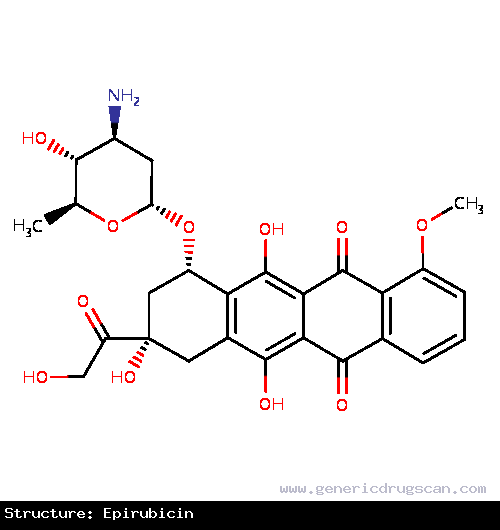Epirubicin Drug: Indication, Dosage, Precaution, Side Effect , Storage, Category Type and corresponding Brands - www.genericdrugscan.com
Epirubicin
Drug Status in USA : ApprovedDrug Status in Canada : Approved
pronunciation
pronounced as (ep i roo' bi sin)
Why is this medication prescribed?
Epirubicin is used in combination with other medications to treat breast cancer in patients who have had surgery to remove the tumor. Epirubicin is in a class of medications called anthracyclines. It works by slowing or stopping the growth of cancer cells in your body.
How should this medicine be used?
Epirubicin comes as a solution (liquid) to be injected intravenously (into a vein) by a doctor or nurse in a medical facility along with other chemotherapy medications. It may be injected once every 21 days for 6 cycles of therapy or it may be injected twice (on days 1 and 8) every 28 days for six cycles of therapy.
Ask your pharmacist or doctor for a copy of the manufacturer's information for the patient.
What are the precautions to be followed?
Before receiving epirubicin injection,- tell your doctor and pharmacist if you are allergic to epirubicin, daunorubicin (Cerubidine, DaunoXome), doxorubicin (Doxil), idarubicin (Idamycin), any other medications, or any of the ingredients in epirubicin injection. Ask your pharmacist for a list of the ingredients.
- tell your doctor and pharmacist what other prescription and nonprescription medications, vitamins, nutritional supplements, and herbal products you are taking or plan to take. Be sure to mention the medications listed in the IMPORTANT WARNING section and any of the following: calcium channel blockers such as amlodipine (Norvasc), diltiazem (Cardizem, Dilacor, Tiazac, others), felodipine (Plendil), isradipine (DynaCirc), nicardipine (Cardene), nifedipine (Adalat, Procardia), nimodipine (Nimotop), nisoldipine (Sular), and verapamil (Calan, Isoptin, Verelan); certain chemotherapy medications such as docetaxel (Taxotere) or paclitaxel (Abraxane, Onxol); or cimetidine (Tagamet). Your doctor may need to change the doses of your medications or monitor you carefully for side effects. Other medications may also interact with epirubicin, so be sure to tell your doctor about all the medications you are taking, even those that do not appear on this list.
- tell your doctor if you previously received radiation therapy or have or have ever had liver or kidney disease.
- you should know that epirubicin may interfere with the normal menstrual cycle (period) in women and may stop sperm production in men. However, you should not assume that you cannot get pregnant or that you cannot get someone else pregnant. Women who are pregnant or breast-feeding should tell their doctors before they begin receiving this drug. You should not become pregnant or breast-feed while you are receiving epirubicin injection. If you become pregnant while receiving epirubicin, call your doctor. Talk to your doctor about birth control methods to use during your treatment. Epirubicin may harm the fetus.
- do not have any vaccinations without talking to your doctor.
What are possible side effects of this medication ?
Epirubicin may cause side effects. Tell your doctor if any of these symptoms are severe or do not go away:- nausea
- vomiting
- sores in the mouth and throat
- stomach pain
- diarrhea
- loss of appetite or weight
- unusual tiredness or weakness
- hair loss
- hot flashes
- red discoloration of urine (for 1 to 2 days after dose)
- sore or red eyes
- eye pain
- darkening of the skin or nails
- pale skin
- fainting
- dizziness
- rash
- hives
- itching
- difficulty breathing or swallowing
Epirubicin may cause other side effects. Call your doctor if you have any unusual problems while taking this medication.
How to store the medication and dispose it of after its use later?
Drug Category/Class
- Antineoplastic Agents
- Immunosuppressive Agents
- Antibiotics, Antineoplastic
- Topoisomerase II Inhibitors
- Antineoplastic and Immunomodulating Agents
- Cytotoxic Antibiotics and Related Substances
- Anthracyclines and Related Substances
- Anthracyclines and related substances
| Prescribed | For use as a component of adjuvant therapy in patients with evidence of axillary node tumor involvement following resection of primary breast cancer. |
| Weight : | 543.5193 |
| Structure | Epirubicin |
 | |
| Formula | C27H29NO11 |
Epirubicin has 31 Brands listed
Search Generic Drugs alphabetically
